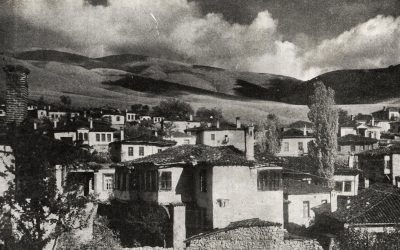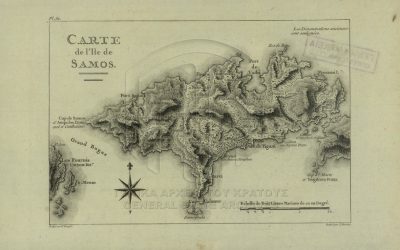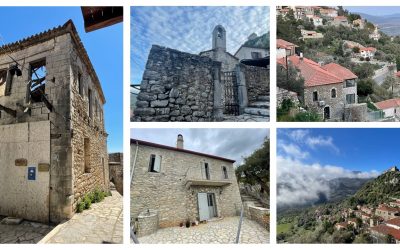By Carol Kostakos Petranek
As 13 and 28 year olds respectively, Paula Antonakos-Boswell and Diane Gotses Jackson dove into family history research with youthful enthusiasm. “I was the kid who sat at the table with the grownups listening to their stories and writing them on pieces of paper and drawing family trees on napkins,” Paula related. “I interviewed my grandmother when I was 28 and 29,” Diane said. Their curiosity and desire to explore their heritage was innate. Now they have joined forces and launched the Amykles-Sklavohori-Mahmoutbei-Godena-Peristeri Village History Group (“Amykles Villages Project”) which has been recognized as the recipient of Greek Ancestry’s October grant of the VPHI. This is a remarkable achievement, as the project is only a few months old, launched in February 2021 after Paula and Diane “met” online at Greek Ancestry’s virtual conference in January.
During the conference, Paula entered her village name of Amykles in the “chat” and Diane responded with her village of Godena. The connection was made and a collaborative spark was lit. They spoke off-line and explored ways to combine their research. The Amykles Project, an archival culmination of 44 years, which Paula formally began in 2016, was subsequently renamed the Amykles Villages Project, when Diane joined and it expanded both geographically and in scope to share ancestral histories, family archives, photos, family trees and stories of the interconnected villages of: Amykle, Sklavohori, Mahmoutbei, Godena, Peristeri, Riza, Vafeio (Marbali), Mandra, Tsaousi, Katsarou, Kalami, Gounari, Kalyvia Socha and surrounding areas.
The project’s Facebook page and website now make the village histories accessible to all. “It’s been a lifelong dream for me to summarize, archive and share all this information, and it has come true,” Paula related. “This is an evergreen process with the goal of becoming a repository of history and photos for the Amykles Villages.”
“Paula had the know-how to start a website, so between the two of us, we carried it away,” Diane explained. Indeed, as a Greek Community Lead and Administrator of the Kingston (Ontario) Greek History Project 2016-2018, Paula wrote grant proposals, conducted oral interviews, created walking/driving tours of the area, and collected photographs and histories. Now housed at Queen’s University, the collection will be available to researchers for perpetuity.
Diane’s interest in research was augmented by her mother-in-law, a librarian and genealogist with roots in the founding of America, and her grandmother. “My grandmother was an inspiration; she would sit at her kitchen table and bring out the family history and get me going. I taped her stories and I am in the process of having them digitized. When my father served in the Army Air Corp, he was in Athens in 1945-46. While in Athens he became acquainted with his first cousin, Pericles Kourniotis. When Dad passed he had a foot locker from World War II in the garage. We opened the trunk and there was a Pavleros family tree that cousin Pericles helped my father complete. This was the beginning of the family tree” [shown below].



Paula was born in Canada and lived in Amykles for several years as a child. Her uncle Sarantos Antonakos, a noted archaeologist, author and historian, brought her on tours of ancient ruins, that he conducted in Lakonia, the Peloponnese and throughout Greece. “He took me on a dig and I was standing over an ancient house which was being excavated. This fascinated and forever affected me,” she recalled.
“In 1986 I was taking Classics 101 at Queen’s University. The Professor, Dr. Dietmar Hagel, brought out my Uncle Sarantos’ book about Amykles and asked, ‘Do you know this man?’ Those were profound words. That’s when I knew that Amykles, (5,000 miles away) was special and historical not just for me, but that it had international historical significance. Dr. Hagel had been on a dig in Amykles just the year before.”
During her many trips to Amykles, Paula and Sarantos went from house to house, village to village, interviewing as many family members as possible. Paula took notes, recorded interviews; and obtained photos. After her uncle became ill, her father accompanied her and her children. “My parents instilled in me a love of family and Greece. I have a picture of my great and great-great grandparents – a treasure – which belonged to my uncle and I took a photo of it. I have a 1963 document, which is an interview scribed by my aunt Eleanor Antonakos, of where a great aunt gives the family history and family tree, going back six generations, and starts with a 1790 story of my great-great-great grandmother coming from Fanari, Constantinople!”

As Diane and Paula grow the Amykles Villages Project into a hybrid of genealogy and culture, they are inviting family, cousins and friends to participate. “We have harnessed the talents of many members, including story tellers, local historians, local newspaper editors, archaeologists and a photographer in Sparta, who has shared drone videos of the villages which younger people especially enjoy,” Paula states. They have partnered with various Amyklaion and Lakonian organizations in Greece and the diaspora. As a result, the family trees are sprouting new branches and the collection of village stories and photos is growing. “The website has a Book section, which lists books that have been written by our ancestors and their descendants, books written about the villages, and links to online articles,” Paula described. “We are working on a section to honor Military Heroes. We have found information that is historically significant about those who fought in wars–whether Balkan, World War II or as resistance fighters–from the 1900’s to the current time period. We hope this initiative will encourage people to contribute stories of their loved ones.”
Diane further explained, “We are finding relatives on my maternal side who fought in wars; and when they were gone, how their wives and children carried on. Think of the strength of the women left behind. Their husbands returned and were not recognized. Men marched from Albania to Argos. They were worn out. My great grandmother fed a man, but it was not until she shaved his face that she learned he was her husband! He had walked so far, he was unrecognizable. The relatives on my paternal side were brought to life with the introduction of Nick Prevas, the Annunciation Church Historian from Baltimore, by Carol Kostakos Petranek. Mr. Prevas directed me to many pictures of my Great Grand Father, John Pavleros, and his assistance with many Laconians in starting the first Church in Baltimore.” Paula and Diane rely on oral interviews, family records and letters, village history books, archival records and DNA tests to expand the Project. Interviewing people is critical to learning about family histories.
“People like to talk about themselves and want others to know about where they came from,” Paula remarked. “They will explain who granted this field to them and who they married.” Sometimes there are written manuscripts, passed down in families, that provide information not found elsewhere. “I have a Kostakis family tree from Argos region that started in the late 1700s,” Diane said. “The priest wanted to make note of the family lineage because of wars, and he was afraid the book would get lost.” Online records such as the Election Registers of the Vlachogiannis Collection, records on Greek Ancestry, and the Sparta Marriages on MyHeritage are now easy to access and are invaluable for documenting families. Unfortunately, many village history books are out of print. However, they can be found in libraries in Greece and occasionally, online. These should not be overlooked as they provide a wealth of knowledge.
Paula and Diane urge people to use Village Facebook pages as a means of connecting with people and learning about the village families. “Upload photos, ask questions,” Diane recommends. “I post and they get back with me. I am meeting new cousins by finding names in common.”
“Everyone should be on their village’s Facebook page,” Paula reaffirms. “Search and see what groups are already there; join the group, start conversations.” If a person who cannot speak Greek plans to visit an ancestral village, Paula suggests using the Facebook page to find people to act as translators and guides.
In conclusion, Diane and Paula encourage people to Just Start! Diane emphasizes: “I tell people, take your children with you and go talk to older people, they are the ones who can tell you about the family. This is something everyone can and should do, so their children and grandchildren can learn more about who they are.” Paula urges: “We can all gather what is available now and we can learn about our peoples’ lives. Start researching and gathering information that has been written about the region and who these people are. You learn more about yourself as you learn more about your heritage.”

Paula Antonakos-Boswell born in Montreal, Canada, descends from generations of ancestors born in Amykles villages. As a child, she lived in Amykles for five years before returning to Canada at age eight. Paula is an active member of her Kingston Greek Community and Church and the Greek Community Lead and Administrator of the Kingston Greek History Project for which she wrote grant proposals, conducted oral interviews, created walking/driving tours of the area, and collected photographs and histories. This collection is now housed at the Queen’s University Archives: https://kingstongreekhistoryproject.com/.
Paula has degrees in Economics, Accounting and Finance from Queen’s University, Kingston, Ontario, Canada. She is also TESOL certified in ESL and a Volunteer English Educator to Immigrant Syrian Refugees in Canada, and she taught English in Spain during the summer of 2018. Paula is also a professional instructor and has taught Accounting at the local Community College for many years.
As the family historian and archivist, Paula is administer of a family website. She is dedicated to her passion for researching and archiving family and village histories. After her retirement as a Canadian Public servant, she will return to Amykles in April 2022 to continue with the Amykles Villages History Project to produce her own walking tour Vlog and to conduct villager Oral History interviews. She and her distant cousin, Diane Gotses Jackson, continue with their goal of making the Amykles Villages History Project a repository of history and photos and which will be accessible to all.
Diane Gotses Jackson was born in San Diego, California and resides in Dallas, Texas. Her Amykles roots stem from her paternal grandmother, Vasiliki (Celia) Pavlerou, who was born in Godena. Her paternal grandfather, Dionysios V. Gkotsopoulos (Gotses), from Agoulinitsa (now Epitalio, Elis), settled in Baltimore, Maryland where he met and married Celia. Diane’s maternal grandparents, from Kefalovriso and Neochori, Agrolidos, arrived at Ellis Island in 1921 and resided in San Diego.

Although she was always interested in history, Diane’s research skills were augmented by the influence of her mother-in-law, a librarian and genealogist in Texas whose ancestors settled in the Americas and fought in the American Revolution and Civil War. The stories told by Diane’s Greek grandmothers inspired her to research her roots in Argos and Lakonia, as did her trip to Greece in 1972. This work accelerated after attending the Greek Ancestry Conference in January of 1921 where she met her distant cousin, Paula Antonakos, and they created the Amykles Village History Project.
Diane is a member of the AHEPA family, continuing the legacy started by her grandfather in Baltimore. She also serves as an officer of the Daughters of Penelope Terpsichore Chapter #105 in Dallas. Diane has a Bachelors in Business Administration from Texas A & M University – Commerce, Texas. She is currently semi-retired and maintains a bookkeeping business. She is the mother of two daughters and three grandchildren.



